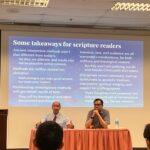
Listening to God: the Practice of Ruminating on Scripture

“Praying the Scripture” is a unique way of dealing with the Scripture; it involves both reading and prayer. Here is how you should begin. Turn to the Scripture; choose some passage that is simple and fairly practical. Next, come to the Lord. Come quietly and humbly. There, before Him, read a small portion of the passage of Scripture you have opened to. Be careful as you read. Take in fully, gently and carefully what you are reading. Taste it and digest it as you read
– Jeanne Guyon, Experiencing the Depths of Jesus Christ
The global Covid-19 pandemic has brought about immense upheavals to many lives, and with it a range of psychological reactions. Some live in fear of catching the virus, others are frustrated with the interruptions and restrictions brought on by the containment measures, while still others worry about the unknown future in the face of such a destructive and unrelenting pandemic. It is important that we be aware of these psychological reactions–and to know how to cope with them.
It is our hope that this series, “Spiritual Resources for Troubled Times,” can serve as a resource to help. In this instalment, we learn a time-tested spiritual exercise that nurtures in us the vital importance of listening to God and ruminating on his inspired Word. Through it, we develop a habit to drink deeply from the fountain of God’s living Word not only to cope but to flourish.
During a time of trouble, it is tempting for us to turn this and that way–especially when we are anxious to find a quick solution to our problems. There may be many offers of help that are appealing and immediately available. Certainly, help from our friends and family are often good and to be received with gratitude. However, sometimes in our anxiety we look only to our own resources, perhaps our allies or our accumulated experience, rather than make the critical turn to look to God and his Word.
Perhaps this global pandemic has caused us to ponder over what is really essential and important in life. When the Circuit Breaker in Singapore ends, and we progress towards a new normal, we wish to emerge with greater prudence, and be instructed by God’s word on the direction we are to head and the decisions we are to make.
The ancient art, Lectio Divina, can form in us a keen sensitivity to God’s invisible, yet unmistakable, guidance for our everyday living. Translated literally, Lectio Divina means divine reading. It is a practice that helps us to read or listen to God’s Word reflectively and prayerfully–and so imbibe the life-giving nutrients from Scripture. For this reason, some practitioners have described it as a contemplative way of praying the Scripture–a formational process through which the Holy Spirit, who inspired the written Word, works to conform us to the eternal Word, Jesus Christ our Saviour and Lord.
There are four movements to this spiritual practice–Lectio (Listen), Meditatio (Meditate), Oratio (Pray), and Contemplatio (Contemplate). I have chosen to use four English words to parallel the four Latin words of the practice to make it easily accessible to us. They are Read, Ruminate, Respond, and Rest. Though apparently sequential they, in fact, strengthen each other and work in a forward spiral movement in practice. We read and ruminate, and return to read and ruminate some more, and perhaps respond in prayer, then repeat the process, before eventually resting in what God has given.
We proceed with a review of the first exercise.
Step 1: Review: (Resting in God: the Practice of Silence)
In the first exercise which was introduced in our first post in the series, we learnt to find rest in God by waiting upon him in silence. God comes to our help and we engage life with the assurance of God’s abiding presence. The practice of waiting upon God in silence is fundamental to daily living.
- If you missed the first exercise, I encourage you to let it help you to settle down into a time in silence.
- If you have practiced it, you may use the first two steps to settle down into silence.
Step 2: Read and Ruminate (Listening to God and His Word)
We now turn to Isaiah 30:15-21a for the theme of this post, “Listening to God: the Practice of Ruminating on Scripture”.
- Begin by reading Isa 30:15-21a reflectively; pondering over the essence of the words.
During a time when Jerusalem was under siege, God offered the distressed Israelites these words:
In returning and rest you shall be saved;
in quietness and in trust shall be your strength. – Isaiah 30:15a (ESV)
- Pause to ponder over God’s invitation to Israel in verse 15a. Do you feel under siege? Do these words appeal to you as well? If so, what is it about them that strikes you?
Unfortunately, the Israelites did not heed God’s word. Instead, they went to the Egyptians for help. As a result, they fled in panic when their enemies drew near.
But you were unwilling, and you said, “No! We will flee upon horses”; therefore you shall flee away; and, “We will ride upon swift steeds”; therefore your pursuers shall be swift. A thousand shall flee at the threat of one; at the threat of five you shall flee, till you are left like a flagstaff on the top of a mountain, like a signal on a hill. – Isaiah 30:15b-17
- Ruminate over verses 15b-17. What went through your mind or moved in your heart? You may want to write them down.
In his mercy, God chose to be gracious to the Israelites. He would be their Teacher, and he would instruct them with his word and direct them on their paths.
- Now read verses 18-21a slowly and reflectively, taking note of your thoughts and the movements in your heart.
Therefore the LORD waits to be gracious to you, and therefore he exalts himself to show mercy to you. For the LORD is a God of justice; blessed are all those who wait for him. For a people shall dwell in Zion, in Jerusalem; you shall weep no more. He will surely be gracious to you at the sound of your cry. As soon as he hears it, he answers you. And though the Lord give you the bread of adversity and the water of affliction, yet your Teacher will not hide himself anymore, but your eyes shall see your Teacher. And your ears shall hear a word behind you, saying, “This is the way, walk in it,” – Isaiah 30:18-21a
- Do these words resonate with you? What might God be saying to you?
- Read the Isaiah 30:15-21a again and pay close attention to what resonates deeply in your heart.
Step 3: Respond (Speaking to God)
You may be confronted with life’s decisions now. Where do I go? Which turn do I make? I ask God to help me to make the critically important turn to him for guidance.
In the face of many options, we come down to a binary choice–do we turn to God or away from God? It does not mean that we should not receive help from elsewhere. Rather, it is that the turn Godward is a most fundamental act to ensure that we are headed in the right spiritual direction in life.
- Use the remaining time to speak to God about all that went through your mind and heart during this exercise. You can be very honest with God regarding all that is confronting you because God knows you and cares deeply about you.
Step 4: Rest (Letting God resource you)
- After you have spent sufficient time in your conversation with God, bring your time to a close by resting in what the Lord has given to you.
- It may be a word that echoes the voice of Jesus, a theme that assures you of God’s guidance or another form of spiritual resource that God has given you.
- Write it down in your journal or somewhere significant for reference during the day.
- Then spend the remaining time in silence as the Holy Spirit seals God’s assurances into your heart.
Step 5: Re-enter (Re-engaging life with the offer of God’s presence)
- Gradually re-enter your day’s activity with the confidence that God goes with you.
The practice of reflective and prayerful reading of Scripture develops in us the spiritual acumen of watchfulness. It is a virtue that we so desperately need in such a time as this. You may choose to practice this exercise in the days ahead using the recommended Scripture texts listed below while I conclude with this citation.
This kind of watchfulness, in turn, facilitates that place in life where we are able to insert a moment of reflection between a thought arising and our acting on it. Here we are less reactive, less volatile, less prejudiced and more able to act out of our love rather than our hurt or anger. Watchfulness provides a path to freedom from destructive thoughts and emotions. It cultivates our ability to allow our minds to dwell on those things that are helpful and good. In time, our hearts themselves are reformed. – James Wilhoit and Evan Howard, Discovering Lectio Divina: Bringing Scripture into Ordinary Life
Texts for meditation on “Listening to God: the Practice of Ruminating on Scripture
- Psalm 119 (meditating on 8 verses at a time)
- Isaiah 30:15-22
- Matthew 11:28-30
- John 10:1-10
- John 10:14-18
- John 14:1-7
- 2 Timothy 3:10-17
Rev Dr Jimmy Tan, Chaplain
Lecturer in Pastoral and Practical Theology








